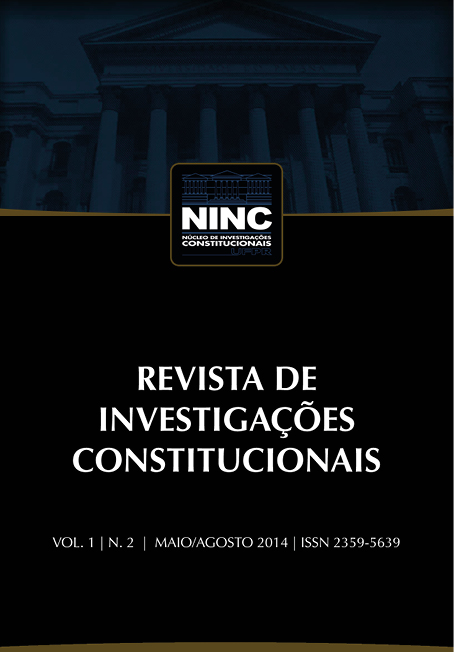Semantics and legal interpretation: an approach from a comparative study of the value of embryonic life under the Argentine and U.S. constitutional case law
DOI:
https://doi.org/10.5380/rinc.v1i2.40510Resumo
The paper analyzes the issue of legal interpretation of the Constitution in the light of a comparative approach between the case law of Argentina and the United States about the value attributed to embryonic life.
Referências
ALEXY, Robert. A Theory of Legal Argumentation: The Theory of Rational Discourse as Theory of Legal Justification. Transalated by Ruth Adler and Neil MacCormick. Oxford: Clarendon Press, 1989.
BALKIN, Jack M. How Genetic Technologies will Transform Roe vs. Wade, Emory Law Journal, Atlanta, v. 56, p. 843-864, 2007.
BIX, Brian H. Can Theories of Reference and Meaning Solve the Problem of Legal Determinacy? Ratio Juris, Oxford, v. 16, p.281-295, 2003.
BRADLEY, Gerard V. Life´s Dominion: a Review Essay. (book review), Notre Dame Law Review, Notre Dame, v. 69, p. 329-, 1993.
BREEN, John M; SCAPERLANDA. Never Get Out the Boat. Stenberg vs. Carhart and the Future of American Law. Connecticut Law Review, Hartford, v. 39, n.1, p. 297-323. 2006.
BRINK, David O. Legal Interpretation, Objectivity and Morality. In: LEITER, Brian. Objectivity in Law and Morals. Cambridge: Cambridge University Press. ed.1, 2001.
CAPRON, Alexander Morgan. Philosophy and Theory: Life’s Sacred Value - Common Ground or Battleground? Michigan Law Review, Ann Arbor, v. 92, p. 1491-,1994.
COLESON, Richard. Judicial Standard of Review and Webster, American Journal of Law & Medicine, Boston, v. 15, p. 211-. 1989.
DWORKIN, Ronald. A Matter of Principle. Cambridge: Havard University Press, 1985.
DWORKIN, Ronald. Freedom’s Law: The Moral Reading of the American Constitution. Cambridge: Havard University Press, 1996.
DWORKIN, Ronald. Law’s Empire. Cambridge: Havard University Press, 1986.
DWORKIN, Ronald. Justice in Robes. Cambridge: Havard University Press, 2006
DWORKIN, Ronald. Objectivity and Truth: You’d Better Believe It. Philosophy and Public Affairs, Princeton, v. 25, p. 87-139, 2006.p.118.
DWORKIN, Ronald. Taking Rights Seriously. Cambridge: Havard University Press, 197
DWORKIN, Ronald. Unenumerated Rights: Whether and How Roe Should Be Overruled, University of Chicago Law Review, Chicago, v. 59, p. 381-, 1992.
FINNIS, John. Natural Law and Natural Rights. 2 ed. Oxford: Clarendon Press, 2011.
FINNIS, John; DEVER, Carolyn (editors). The international library of essays in law & legal theory series. v.1, Dartmouth: Dartmouth Press, 1991.
GREEN, Abner S. Uncommon Ground, George Washington Law Review, Washington, D.C. v.62 p.646-650, 1994.
KALINOWSKI, George. Introducción a la Lógica Jurídica. Traducida por Juan A. Casaubon. Buenos Aires: Eudeba, 1973.
KAMM, Frances M. Abortion and the Value of Life: A Discussion of Life’s Dominion, (book review).Columbia Law Review, New York, v. 95, p. 160-122, 1995.
KRIPKE, Saul. Naming and Necessity. Oxford: Blackwell, 1980.
LUGOSI, Charles. Conforming to the Rule of Law: When Person and Human Being Finally Mean the Same Thing in the Fourteenth Amendment Jurisprudence. Issues in Law & Medicine, Chicago, v. 22, p. 119-303, 2006/2007.
MOORE Michael S. Justifying the Natural Law Theory of Constitutional Interpretation, Fordham Law Review, New York, v. 59 p. 2087-2117, 2001.
PUTNAM, Hillary. Meaning and reference. Journal of Philosophy, Hanover, v.70, p. 699-711, 1973.
RAKOWSKI, Eric. The Sanctity of Human Life, (book review) Yale Law Journal, New Haven, v. 103, p. 2049-, 1994.
RONHEIMMER, Martin. Fundamental Rights, Moral Law, and the Legal Defense of Life in a Constitutional Democracy: A Constitutionalist Approach to the Encyclical Evangelium Vitae, The American Journal of Jurisprudence, v. 43, p.135-183, 1998.
STACY, Tom. Reconciling Reason and Religion: On Dworkin and Religious Freedom. George Washington Law Review, Washington, D.C., v. 63, n.1, p.1-75, 1994.
STAVROPOULOS, Nicos. Objectivity in Law. Oxford: Clarendon Press, 1996.
STENGER, Robert. Embryos, Fetuses and Babies: Treated as Persons and Treated with Respect. Journal of Health & Biomedical Law, Boston, v.2, n.1, p. 33-67, 2006.
STITH, Richard. On Death and Dworkin: A Critique of his Theory of Inviolability. Maryland Law Review, College Park, v. 56, n. 2, p. 289-383, 1997.
WRÓBLEWSKI, Jerzy. Sentido y hecho en el derecho. Tradución: Francisco Javier Ezquiaga Ganuzas e Juan Igartua Salaverría. v.9, series Doctrina Jurídica Contemporánea. México: Fontamara, 2001.
VALLAURI, Luigi Lombardi. Corso di filosofía del Diritto, Padova: CEDAM, 1995.
VINCINGUERRA, Joshua S. Showing “Special Respect” – Permitting the Gestation of Abandoned Preembryos. Albany Law Journal of Science & Technology, Albany, v.9, p. 399-422, 1999.
WALEN, Alec. The Constitutionality of States Extending Personhood to the Unborn, Constitutional Comentary, Buffalo, v. 22 p.161, 2005.
YANG, Diane K. What’s Mine is Mine but What’s Yours Should Also Be Mine: An Analysis of State Statutes that Mandate the Implantation of Frozen Preembryos. Journal of Law and Policy, v. 10, p. 587-592, 2002.
ZAMBRANO, Pilar. Los derechos ius-fundamentales como alternativa a la violencia. Entre una teoría lingüística objetiva y una teoría objetiva de la justicia. Persona y Derecho, Navarra, n. 60, p. 131-152, 2009.
ZAMBRANO, Pilar. La inevitable creatividad en la interpretación jurídica una aproximación iusfilosófica a la tesis de la discrecionalidad. México: Instituto de Investigaciones Jurídicas, 2009.
ZAMBRANO, Pilar. Objetividad en la interpretacion judicial y objetividad en el Derecho. Una reflexion a partir de las luces y sombras en la propuesta de Ronald Dworkin. Persona y Derecho, n. 56, p. 281-326, 2007.
Downloads
Como Citar
Edição
Seção
Licença
Autores que publicam nesta revista concordam com os seguintes termos:- Autores mantém os direitos autorais e concedem à revista o direito de primeira publicação, com o trabalho simultaneamente licenciado sob a Creative Commons - Atribuição 4.0 Internacional que permite o compartilhamento do trabalho com reconhecimento da autoria e publicação inicial nesta revista.
- Autores têm autorização para assumir contratos adicionais separadamente, para distribuição não-exclusiva da versão do trabalho publicada nesta revista (ex.: publicar em repositório institucional ou como capítulo de livro), com reconhecimento de autoria e publicação inicial nesta revista.
- Autores têm permissão e são estimulados a publicar e distribuir seu trabalho online (ex.: em repositórios institucionais ou na sua página pessoal) a qualquer ponto antes ou durante o processo editorial, já que isso pode gerar alterações produtivas, bem como aumentar o impacto e a citação do trabalho publicado (Veja O Efeito do Acesso Livre).
























